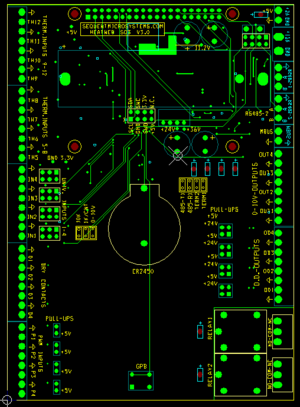Difference between revisions of "Heatweb BEMS Hat"
| Line 29: | Line 29: | ||
DIP selected pull-up resistors (5V)<br> | DIP selected pull-up resistors (5V)<br> | ||
Voltage comparator<br> | Voltage comparator<br> | ||
< 3V | Low state: < 3V<br> | ||
High state: > 3V | |||
|- | |- | ||
|4 x PWM outputs | |||
|DIP selected pull-up resistors (5V/24V) | |||
|- | |||
|4 x 0-10v outputs | |||
|10mA peak current | |||
|- | |||
|2 x RS485 | |||
|Independent lines for Modbus or bespoke protocols<br> | |||
DIP switch selectable terminating resistors<br> | |||
One line DIP switchable for Modbus Slave Mode | |||
|- | |||
|1 x M-Bus | |||
|For meter communications<br> | |||
On-board supply: 36V @ 30mA<br> | |||
Device limit: 10 | |||
|- | |||
|Power Supply | |||
|Nominal voltage: 12VDC<br> | |||
Current requirement: 3A<br> | |||
Minimum supply voltage: 11.8V<br> | |||
Peak supply voltage: 16V | |||
|- | |||
|Battery support | |||
|On-board rechargeable battery socket<br> | |||
Maintains power to all systems (5V, 24V & 36V) during loss of supply<br> | |||
Voltage monitoring with safe shutdown<br> | |||
Duration: > 1 hour | |||
|- | |||
|Real time clock | |||
| | | | ||
|- | |||
|General purpose input button | |||
| | |||
|- | |||
|3 x user definable LEDs | |||
| | |||
|- | |||
|Fan control and connector | |||
| | | | ||
|- | |- | ||
Revision as of 17:45, 4 October 2022
| 8 x thermistor inputs |
10k resistance temperature devices |
| 4 x universal inputs |
100Hz pulse signals |
| 4 x volt-free / pulse inputs |
100Hz pulse signals |
| 2 x change-over relays | 10A @ 36V |
| 4 x PWM inputs |
DIP selected pull-up resistors (5V) |
| 4 x PWM outputs | DIP selected pull-up resistors (5V/24V) |
| 4 x 0-10v outputs | 10mA peak current |
| 2 x RS485 | Independent lines for Modbus or bespoke protocols DIP switch selectable terminating resistors |
| 1 x M-Bus | For meter communications On-board supply: 36V @ 30mA |
| Power Supply | Nominal voltage: 12VDC Current requirement: 3A |
| Battery support | On-board rechargeable battery socket Maintains power to all systems (5V, 24V & 36V) during loss of supply |
| Real time clock | |
| General purpose input button | |
| 3 x user definable LEDs | |
| Fan control and connector | |
- 8 x dedicated NTC temperature sensor inputs
- 10k resistance temperature devices
- 4 x universal inputs
- 100Hz pulse signals
- volt-free contacts
- 0-10V signals
- 1k or 10k thermistors
- 4 x volt-free / pulse inputs
- 100Hz pulse signals
- volt-free contacts
- 2 x change-over relays
- 10A @ 36V
- 4 x PWM inputs
- DIP selected pull-up resistors (5V)
- Voltage comparator
- < 3V low, > 3V high
- 4 x PWM outputs
- DIP selected pull-up resistors (5V/24V)
- 4 x 0-10v outputs
- 2 x RS485 lines for Modbus or bespoke protocols, with jumper switched terminating resistors
- On board Modbus for daisy chaining multiple boards to a single controller
- M-Bus meter communications
- On-board battery supported uninterruptable power supply
- Real time clock
- General purpose input button
- 3 x user definable LEDs
- Fan control and connector
- Runs from a 12v power supply
- 24v uninterruptable output power for valves generated on-board
- 5v uninterruptable output power for sensors generated on-board
- 36v uninterruptable output power for M-Bus generated on-board
The Heatweb BEMS Hat runs from a 12v dc supply, generating 5v for the board, 24v for valves, and 36v for M-Bus, using on-board dc-dc converters backed up by a rechargeable battery. A coin cell is used to power a real-time clock.
WiFi, Ethernet and Bluetooth are provided by the parent controller board.
A number of the inputs are universal, and can be switched between NTC, 0-10v, or volt-free / pulse inputs (jumper selected). This ability to alter the hardware setup increases versatility significantly.
The addition of M-Bus allows us to connect to heat meters as standard, making the board a stand alone solution to open-sourcing meter data, and to use meter data within control logic.
The battery backup allows us to safely shut-down all valves and the controls when power is removed. This overcomes a common problem with HVAC systems, where valves typically remain open, destroying network performance.
